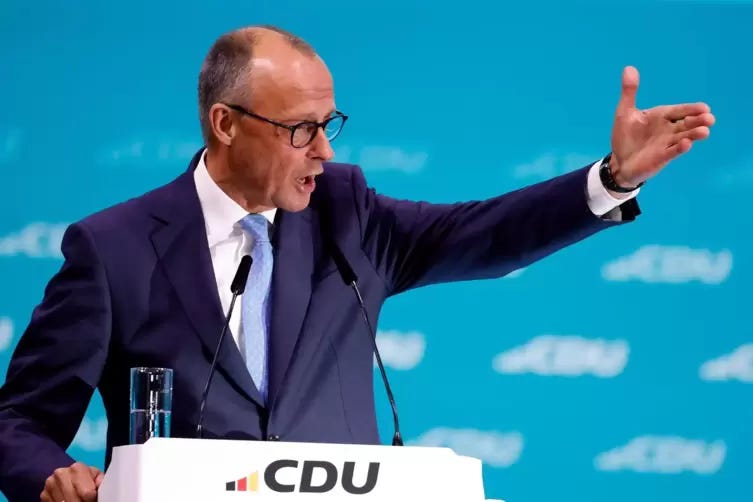Europe is moving to the Right Wing, and that is Okay
Between Idealism and Realist Governance

Friedrich Merz once proclaimed: “There is no leftist majority to be found in Germany!”
Whether in Romania, Poland, or East Germany, the centre of democratic politics has shifted substantially to the right. The close victory of Pro-Europeanism in Romania was not won in a fight between the Left Wing and the Right Wing, but a centrist liberal platform against a far-right extremist candidate. In Poland, the contest is not between left and right at all, but between two versions of the right: one pluralist and pro-European, the other illiberal and authoritarian. Civic Platform, Poland’s centrist-conservative opposition, now carries the hopes of liberal Europe, a sign of both its strength and the left’s irrelevance. The same is true for much of Eastern Germany, where the traditional right-wing party in Germany, the CDU, is fighting primarily for influence against the far-right, extremist AfD.
This trend should force European liberals and democrats to confront a serious, perhaps uncomfortable question:
Is the only viable democratic majority in Europe now found to the right of the center?
History suggests that in times of profound insecurity, democratic societies often shift their trust toward the conservative spectrum, not out of ideological commitment, but in search of order, stability, and statecraft. We have seen this before.
In the aftermath of the Second World War, and again during the renewed geopolitical tensions of the Second Cold War in the 1980s, Europe turned to conservative leadership. From Konrad Adenauer and Charles de Gaulle to Margaret Thatcher and Helmut Kohl, these figures offered a blend of firmness, institutional loyalty, and national vision—qualities that appealed to electorates facing external threat and internal drift.
We may be entering such an era once again in many parts of Europe. The societal divide is no longer left versus right, but the centre-right, bolstered by the entire democratic spectrum, against the extremists on the far right.
Across the North European Plain, a revisionist Russia is waging a war of aggression and extermination. To the East, an assertive and authoritarian China is working to reshape the global order. And in the West, a volatile and inward-looking American administration is weakening the foundations of the liberal alliance.
In these moments, European nations are slowly turning towards an international, hawkish, and pro-EU conservatism, yet one fundamentally rooted in liberal democratic traditions, with a few exceptions. The democratic left, meanwhile, has lost much of its influence since the 2010s. This is not a coincidence. It is the result of a failure to adapt to a world increasingly defined by power politics, state capacity, and national cohesion. This tells us that European leftists are the ones in dire need of reform and self-criticism. No matter my personal beliefs and values, I must recognize that this is not the moment for ambitious societal reform, expansive irregular immigration policies, or an uncompromising climate agenda divorced from geopolitical realism.
Each of these goals may be legitimate in its own right, and I do not renounce them. But I must recognize that the defense of our democratic institutions and our values-based world system must come first. Without security, sovereignty, and strategic clarity, there can be no foundation upon which to build progressive reform.
We are living through a conservative interregnum. It may not be what the left wants, but it may be precisely what Europe needs.




